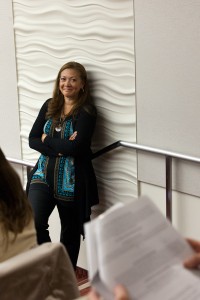Michele Norris discusses ‘Race Card Project’
On Wednesday afternoon, USC Spectrum hosted the event The Race Card Project: A Conversation with Michele Norris. The discussion took place in the Rosen Screening Room on the second floor of the Ronald Tutor Campus Center and was moderated by George J. Sanchez, vice dean for diversity in the Dornsife College of Letters, Arts and Sciences.

All smiles · Radio journalist Michele Norris said she was impressed by students’ openness with the issue of race and identity on Wednesday. – Ralf Cheung | Daily Trojan
Norris is a radio journalist and current host of National Public Radio. She created The Race Card Project as an online communityto start conversations about race and identity.
Norris handed out “race cards” at the beginning of her talk so that all those who attended could fill them out with six words about race.
“I’ve been listening to NPR for years and knowing that Michele Norris is here was exciting for me,” said Jenny Di, a freshman majoring in policy, planning and development.
When Norris first began the project, she was worried that people would feel uncomfortable talking to her. After sending out a preliminary set of race cards, however, about 30 percent of the cards were returned to her. Within eight months, Norris moved the Race Card Project to social media.
“Diversity was important for a long time because it was about equality, but now sometimes people take diversity for granted since it comes so easily,” Norris said.
At first, many of the cards came back from anonymous writers, but over time, people began to come forward with their stories and experiences and were willing to give their names.
Norris presented points about how people view themselves and others based on race. She said being aware of others’ stories allows people to see them in a different light.
According to The Race Card Project’s website, Norris asked people to think about their experiences, hopes, questions, dreams, laments and observations about race and identity and put their ideas into a sentence with only six words. This sentence would make up their “race cards.” Some of these cards were also accompanied by a story explaining the history behind why people selected their six words.
“There are a lot of new things she brought up for me, specifically about the stories of people who used to be oppressors and asking them to offer their stories,” said Rachel Jones, a junior majoring in political science.
Norris mentioned that a lot of the time, people are uncomfortable talking about race, but she said The Race Card Project helps pull race out of the shadows.
“I was humbled by how much people can pack into just six words,” Norris said.
Many students wrote personal notes for the Race Card Wall.
“I’m a human, not a fruit,” Gabrielle Guzman’s note read.
“Indian with a feather, not a dot,” Courtney Randolph wrote on hers.
Rather than viewing race as “taboo,” Norris attempted to break down that barrier.
“[Norris] talks about the importance of conversation and how we need to do it a lot and meet with people,” Jones said. “We live on a very diverse campus and we should be able to talk to each other.”
The Race Card Project has teamed up with the University of Michigan and the University of Wisconsin, Madison to encourage people associated with the universities to join in the conversation.
The talk concluded with Norris passing around a booklet containing quotes from various peoples’ six-word “race cards,” and a Q&A session.
Follow Alexandria on Twitter @alimar18
